
Part 8 - Leadville, Mining Museum, Tabor
Opera House
Today we explored several historical sites in the Leadville
area. We focused less on trains and railroads today, but still managed to
have a short ride on the Leadville, Colorado & Southern (standard gauge)
Railroad.
Today was also our first day without bright sunshine. It
was quite a bit cooler today (temps in the 60s), and it rained all afternoon.
That gave me a reason to pull out the warmer clothes out of the suitcase (where
they hadn't been touched!).
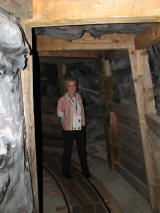 |
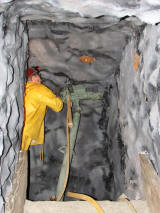 |
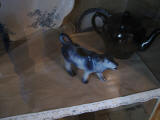 |
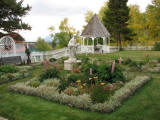 |
| We explored the underground mine exhibit in the
National Mining Hall of Fame and Museum in Leadville. |
Dad will appreciate the mine roof bolts that show up
in this museum display. |
In the neighboring Healy House historical museum, we
found this "puking cow" creamer in the collection of late-nineteenth
century furnishings. We have a modern-day puking cow creamer at
home. |
Mo liked the gardens at the Healy House, and thought
we ought to do this in our front yard. |
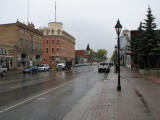 |
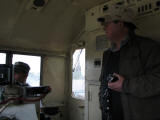 |
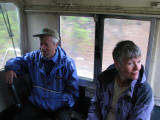 |
 |
| The rains came to downtown Leadville. In the
mining heyday of the late 1800s, the town was the second largest in
Colorado, with a population in excess of 30,000. Today, the
population is under 3,000. |
I was able to ride in the cab of the GP-9 on our
Leadville, Colorado & Southern excursion. Engineer Steve is just
23 years old! Charles Hill, also from our tour group, was quizzing
Steve about railroad operations. |
Fellow tour members Charlie Treuhold and Lesley
Mitchell also enjoyed the cab ride. |
A view of the foliage from the cab of our train. |
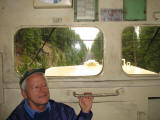 |
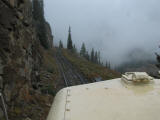 |
 |
 |
| Looking out the cab window. |
|
The foliage display was brilliant today. |
|
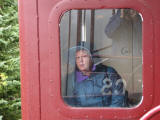 |
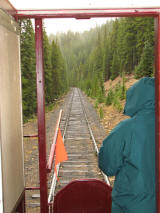 |
 |
 |
| Carol Bowditch eyes me warily from her seat in the
caboose of our train. If you look closely at the reflection in the
glass, you can see me taking the picture. |
Looking out the back door of the caboose. |
Brilliant fall foliage. |
Terry enjoying the view from the cupola in the
caboose. |
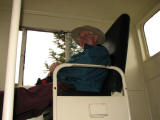 |
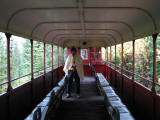 |
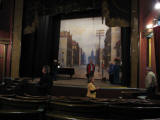 |
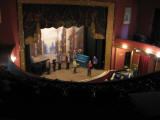 |
| Jay Bowditch was also enjoying the cupola ride. |
Elwin LeFevre had this open car to himself!
Most passengers had migrated to the enclosed cars to stay away from the
rain. |
After we returned to Leadville from our train trip,
we toured the Tabor Opera House, built in 1879 at the height of the
silver mining boom. |
The interior of the Tabor Opera House, taken from the
balcony. |
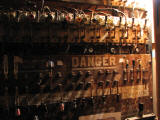 |
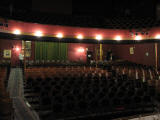 |
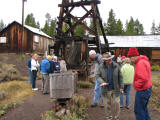 |
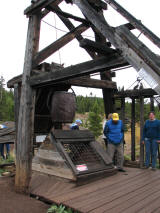 |
| The lighting panel (still in use) at the opera house. |
The main seating area in the opera house, taken from
the stage. |
We enjoyed a tour of the Matchless Mine, which was
originally owned by Horace Tabor and his wife Baby Doe. |
The central shaft of the mine (closed now for many
years) drops some 360 feet below the surface. You can see the
wooden ladders the miners used to descend into the mine, where they made
less than $3 for a twelve-hour workday. |
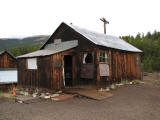 |
|
|
|
| This is the cabin at the mine where Baby Doe Tabor
lived until her death in 1935. The story of Horace and Baby Doe
Tabor offers a fascinating glimpse into boom and bust silver mining.
Google them! |
|
|
|
![]()
























